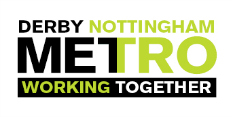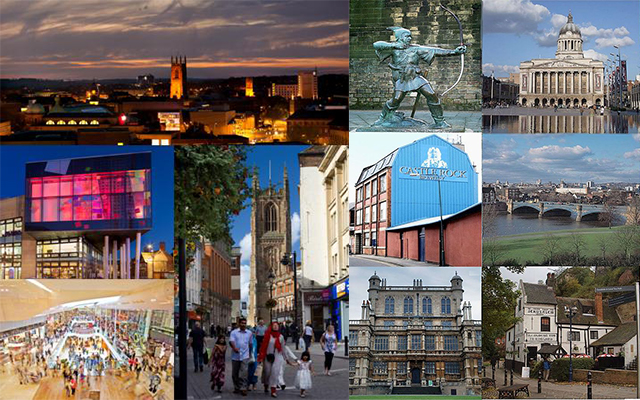
A new strategy which will bring Nottingham and Derby together has been launched nine months after a bid for regional devolution faltered.
In a consultation by Nottingham and Derby City Councils, three quarters of people agreed both cities would benefit from working together more closely – leading to the Derby-Nottingham Metro Strategy 2030.
Originally called the ‘Metropolitan Strategy’, the Derby-Nottingham Metro Strategy, is designed to give a better economic future for the two Midlands cities – but both councils say it is not a replacement for devolution.
It comes after a combined bid to the Government for great powers for Derbyshire and Notts fell flat last year.
Bus travellers will benefit from the new strategy, with cheaper fares being offered to encourage people to attend top summer attractions in each city.
A £1 saving on any Trentbarton route for people going to selected events marks the formal launch of the Metro Strategy, strengthening co-operation between the two cities.
The strategy sets out a vision of what Derby and Nottingham City Councils want the area to look like by 2030:

- Enterprise – promoting Derby and Nottingham world-wide, supporting businesses to innovate and find new markets
- Talent – ensuring a suitably skilled workforce through education and training
- Connectivity – improving accessibility through better transport links
- City Living – supporting a modern urban lifestyle and vibrant city centres through leisure, culture and sport
The combined urban area of the two cities is one of the top 30 population centres in Europe and home to more than one million people – more than 40,000 of them regularly commute between Derby and Nottingham.
Steve Spear, former employee of Nottingham City Council as Director of Strategy and Commissioning for Nottingham Crime and Drugs Partnership, says the two cities should unite as ‘A New Unitary Authority of Nottingham and Derby’ called ‘Trent City’.
Time to recognize that Derby & Nottingham separated by 4 fields only https://t.co/ntya234Cyq pic.twitter.com/ENU8jfJ29w
— Steve Spear (@stevespear1951) 26 October 2015
“Working together will make Nottingham and Derby much stronger, and a much stronger presence in both national and world markets – they’ll be able to sell themselves much better as two cities working together, than two cities working apart,” he said.
“The Derby-Nottingham Metro Strategy 2030 is a good first step in terms of working together and a necessary one as well, they need to show each other that they can work together.
“The more the two cities work together and the advantages can be seen, then more and more people will see it as an advantage for the area – both areas have so much to offer we need to bring it together.
Steve, who lives in Derbyshire, added: “In reality what we need is a single government for both cities, that way we won’t need to have compromise from both cities, however the strategy is only an agreement between the two city councils and the problem with both cities is that they have very tight boundaries.
“They need to involve the district councils and county councils in between if they are going to make a real go at this but it is a really good first step.”
Video: Hugh Casswell reports on the demise of the devolution deal in July 2016.
Closer working as a result of the Metro Strategy is already reaping rewards; the council says it has secured strong support from the Department of International Trade for last year’s trade mission to China and the MIPIM international commercial property show.
It has also helped establish a forum to put local businesses in a strong position to take advantage of the £250 million Midlands Engine Investment Fund.
And it has won more than £13 million of Government and EU funding through joint bids for projects covering business investment, travel and the environment.
Councillor Jon Collins, Leader of Nottingham City Council, said: “The consultation clearly showed that the majority of people could see the benefits of the two cities working closely together.
“Our combined weight will enable us to strengthen our national presence and international reputation. This will be good for our cities, good for local people and good for the wider economy.”

Following the strategy launch, a special advisory group is being set up to act as a sounding board for its future direction, which will be led by David Williams, Chairman of law firm Geldards, which has a presence in both cities.
Mr Williams said: “I have no hesitation in supporting this work, as it makes perfect sense for the two cities to come together.
“How effectively we work across organisations and sectors to get the most for local residents, employees and visitors will be a decisive factor in maintaining and growing our local prosperity and pride.”
The Metro offer with Trent Barton will be see discounted bus travel between Derby and Nottingham when people buy a ticket to any of the top ten summer events listed below.
- Derby Comedy Festival – 5 – 14 May
- Aegon Open International Men’s and Women’s Tennis, Nottingham – 10 – 18 June
- ICC Women’s World Cup Cricket, Derby – 24 June – 19 July
- Dinosaurs of China Exhibition, Nottingham – 1 July – 29 Oct
- Derby CAMRA Summer Beer Festival – 5 – 9 July
- Splendour Festival, Nottingham – 22 July
- British Triathlon Mixed Relay Cup, Nottingham – 2 Sept
- Derby Feste – 29 – 30 Sept
- Derby Folk Festival – 6 – 8 October
- Robin Hood Pageant, Nottingham – End of October

















